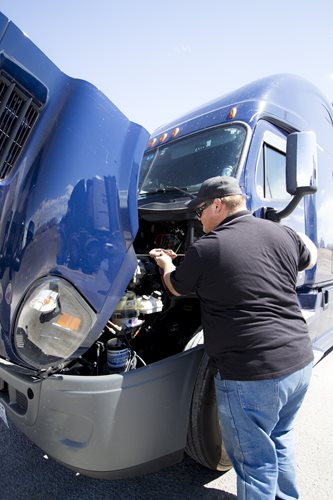
Unexpected events are just that. Unexpected. They happen without warning. You can't plan on them, schedule them or avoid them. As professional truck drivers, there are things we can do to minimize their occurrences, or at least lessen their effect on us.
Whether it's a blown steer tire, an object in the middle of the road, or a crazy driver, expecting that these things will happen, and looking out for them, is the first step to avoiding them. Here are some things I have found that help.
Don't Shortcut the Pre-trip
TIres blowing, belts breaking, hoses rupturing, if they happen in the wrong place and at the wrong time, in addition to hurting productivity, they can lead to costly repairs. You’ll be stuck paying a large tow bill and, worst-case scenario, a blown tire could lead to an accident and maybe injury or death. Whether you are an Owner-Operator or company driver, a thorough pre-trip is a good way to identify potential issues that may cause an "unexpected" breakdown on the road.
Make sure to visually check the belts for cracks or signs of wear. Give them a tug to make sure they aren't loose. Check the hoses for leaks. Check the tires for proper inflation, signs of irregular wear, cuts or bulges, and objects that may be stuck in them. Check the steering and suspension for loose or broken parts. Check the 5th wheel to make sure you are still securely connected. While breakdowns will inevitably still happen, making sure your truck is in proper working order is the best way to minimize these occurrences.
Keep Your Eyes on the Road
Looking for potential hazards on the road is key to avoiding unexpected lane changes and potential damage to your truck. This can only be done if you are paying attention to the road. Texting is not the only thing that takes our eyes off the road. Changing radio stations, picking out a favorite song from a playlist, grabbing a burger out of a bag are just some of the things that can distract us and take our eyes off the road. This can lead to us not seeing potential hazards such as a blown tire, dead animal, piece of furniture, or a pothole in the road.
Anything that blocks our view of the road is also hazardous. That includes vehicles in front of us. Following too closely blocks your view of the road ahead. If you can't see around the truck in front of you, you definitely can't see what is in front of it. If that vehicle needs to swerve or make a sudden stop, will you be able to? Backing off and leaving space helps to see these obstacles and is a good way to avoid unexpected hazards on the road. It is also a good way to help avoid making unexpected maneuvers.
Be Vigilant
Keeping our eyes on the road also includes being aware of what is behind us and beside us. Constantly checking our mirrors allows us to see what is going on around us. Knowing our surroundings can help us make decisions that can keep us out of accidents. Paying attention to the vehicles coming up beside us and being prepared for any erratic moves they may make allows us to be better prepared if they do make that idiotic move. It is easy to get "zoned in" to the road. Like a fellow driver and friend of mine says, “Keep your head on a swivel.” It works.
All of these things are simple but take constant vigilance. Unexpected events will still happen, but we will be much better off if we do everything we can to minimize them.